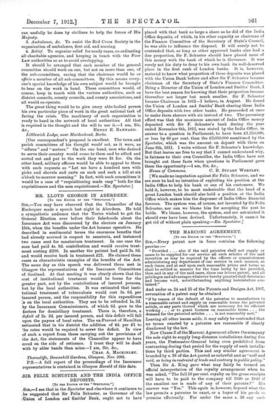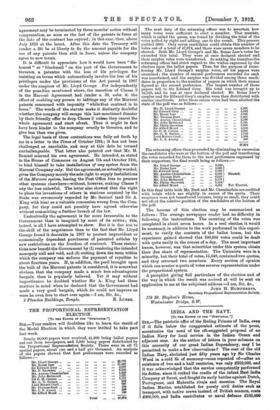THE MARCONI AGREEMENT.
[To THE EDITOR 07 THE "SPECTATOR."] SIR,—Every patent now in force contains the following
proviso :—
"Provided . . . also if the said patentee shall not supply or cause to be supplied for our service all such articles of the said invention as may be required by the officers or commissioners administering any department of our service in such manner, at such times, and at and upon such reasonable prices and terms as shall be settled in manner for the time being by law provided, then and in any of the said cases, these our letters patent, and all privileges and advantages whatever hereby granted shall determine and become void, notwithstanding anything hereinbefore con- tained."
And under as. 24 and 25 of the Patents and Designs Act, 1907, revocation of a patent may be obtained "if by reason of the default of the patentee to manufacture to a reasonable extent and supply on reasonable terms the patented article, or any parts thereof which are necessary for its efficient working. . . or to grant licences on reasonable terms . . . the demand for the patented articles. . . is not reasonably met."
Leaving all other issues aside, it may safely be contended that no terms exacted by a patentee are reasonable if clearly
disallowed by the law.
Now Clause 3 of the Marconi Agreement allows the company the sole right to supply long-distance installations during five .years, the Postmaster-General being even prohibited from contracting during that period for the supply of such installa- tions by third parties. This and any similar agreement is branded by s. 38 of the Act quoted as unlawful and as "null and
void, as being in restraint of trade and contrary to public policy." Then Sir A. King gave what may fairly be termed an official interpretation of the royalty arrangement when be was asked, "The full 10 per cent, royalty on the gross receipts will have to be paid to the company till 1930 or 1940 if
the smallest use is made of any of their patents P" His answer was "Yes." This again is, however, beyond what the law permits a patentee to exact, or a buyer of his goods to promise effectually. For under the same s. 38 any such
agreement may be terminated by three months' notice without compensation, as soon as the last of the patents in force at the date of the contract has expired ; in this case, then,.about July 1926 at the latest. After this date the Treasury will (under s. 29) be at liberty to fix the amount payable for the use of any patents then still in force, unless the company agree to new terms.
It is difficult to appreciate how it would have been " dis- honest " or " blackmail " on the part of the Government to threaten a patentee with the loss of his privileges for insisting on terms which automatically involve the loss of his privileges under the provisions of the Act passed in 1907 under the auspices of Mr. Lloyd George. For independently of the penalties mentioned above, the insertion of Clause 3 in the Marconi Agreement had (under s. 38, subs. 4) the effect of enabling any person to infringe any of the Marconi patents concerned with impunity "while that contract is in force." The words of the statute make it distinctly doubtful whether the company will escape this last-mentioned disaster by their friendly offer to drop Clause 3 unless they cancel the whole agreement and start afresh. Thus it might in fact have been kinder to the company cruelly to threaten, and to give less than was given.
The legal basis of these contentions was fully set forth by me in a letter to the Times of October 12th; it has not been challenged as unreliable, and may at this date be termed unchallengeable. That letter also pointed out that Mr. H. Samuel misread his own agreement. He intended, as stated in the House of Commons on August 7th and October 11th, to bind himself to take installations of any system from the Marconi Company only. But the agreement, as actually worded, gives the Company merely the sole right to supply installations of the Marconi system, leaving the Post Office free to procure other systems elsewhere—without, however, making Clause 3 any the less unlawful. The letter also showed that the right to place the inventions of others in stations acquired by the State was erroneously regarded by Mr. Samuel (and Sir A. King with him) as a valuable concession wrung from the Com- pany, for they could not possibly have agreed otherwise without committing a further breach of the law.
Undoubtedly the agreement is far more favourable to the Government than is imagined by most of its critics ; this, indeed, is all I have attempted to show. But it is due less to the skill of the negotiators than to the fact that Mr. Lloyd George found it desirable in 1907 to protect improvident or economically dependent purchasers of patented articles by new restrictions on the freedom of contract. These restric- tions now benefit the Government by (1) rendering the intended monopoly null and void, and (2) cutting down the term within which the company can enforce the payment of royalties to about fourteen years. If, in addition, the peril brought upon the bulk of the Marconi patents is considered, it is somewhat obvious that the company made a much less advantageous bargain than is popularly believed. Yet it may without impertinence be doubted whether Sir A. King had these matters in mind when he declared that the Government had made a very good bargain, which he could not improve on were he even free to start over again.—I am, Sir, &c.,







































































 Previous page
Previous page